Overflow of Yamuna can impact your health in many ways, Know here
The overflow in Yamuna can cause health risks. However, the risks can be surely minimized with some precautionary measures.
Heavy rains have affected several regions of Northern India very badly. Delhi, especially, has been dealing with a flood crisis. The water level in Yamuna has recorded the highest of all time, with water flowing at 208 meters. Now when the situation has started improving, there are still some areas that continue to deal with the water logging situation.
It is to be kept in mind that clogged water, is a source for several diseases. Hence, the overflow in Yamuna can cause health risks. However, the risks can be surely minimized with some precautionary measures. To know what those diseases are, scroll below:
Water borne and Vector borne diseases
The clogged water may be contaminated with sewage, industrial waste, and other harmful substances as well. This increases the risk of waterborne diseases like typhoid, cholera, gastroenteritis, and also hepatitis A.
Similarly, stagnant water is an apt breeding ground for mosquitoes. Hence, diseases like dengue, malaria, and chikungunya can spread rapidly as well.
Skin infections and Respiratory problems
Direct contact with stagnant and contaminated water can cause several skin infections. Especially cuts and open wounds are much vulnerable to polluted water. Skin rashes, irritations are likely to arise if unclean and polluted water is exposed to skin for prolonged hours.
Stagnant water promotes the growth of harmful bacteria that can cause respiratory issues and can cause asthma and allergies. To combat this, it is advisable to keep your windows closed to maintain indoor air quality.
Hypothermia
In times of flooding and continuous water logging, hypothermia is more likely to affect children and elder people. People should try to keep their bodies warm with adequate warm clothing.
Preventive Measures
There are some preventive measures that can be taken to reduce the risks of getting infected
- Minimize skin exposure by wearing full sleeved clothes.
- Try sticking to fresh home-cooked meals rather than consuming outside junk food.
- Try to keep the areas around your house dry.
- Prevent water accumulation in areas around your house.
- Drink sufficient water and practice personal hygiene.




 Ms Kalinga
Ms Kalinga